Your Planets
Portraits of the Planets
Aspects between Planets
The planetary ages
The planetary families
Planets in Signs
The Planets in comics
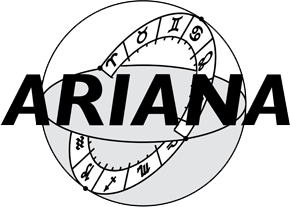

Three months have already passed since the birth of the child. The time flies! And meanwhile, silently, the planets continue their course around the Sun. Three months is the time it takes to complete its first revolution, thus marking the end of the stage mercurian. From now on, the distant star that will preside over the baby’s new learning is Venus, whose revolution time is exactly 225 days.

Astrologers have made Venus the planet of love, of desire, of the flesh. Is it hard that the baby will suddenly transform, at the beginning of its fourth month of existence, into sex symbol ? Of course not… It is however clear that it is between three and eight months, therefore during the Venusian stage, that sensuality, sensoriality and affectivity develop in him.
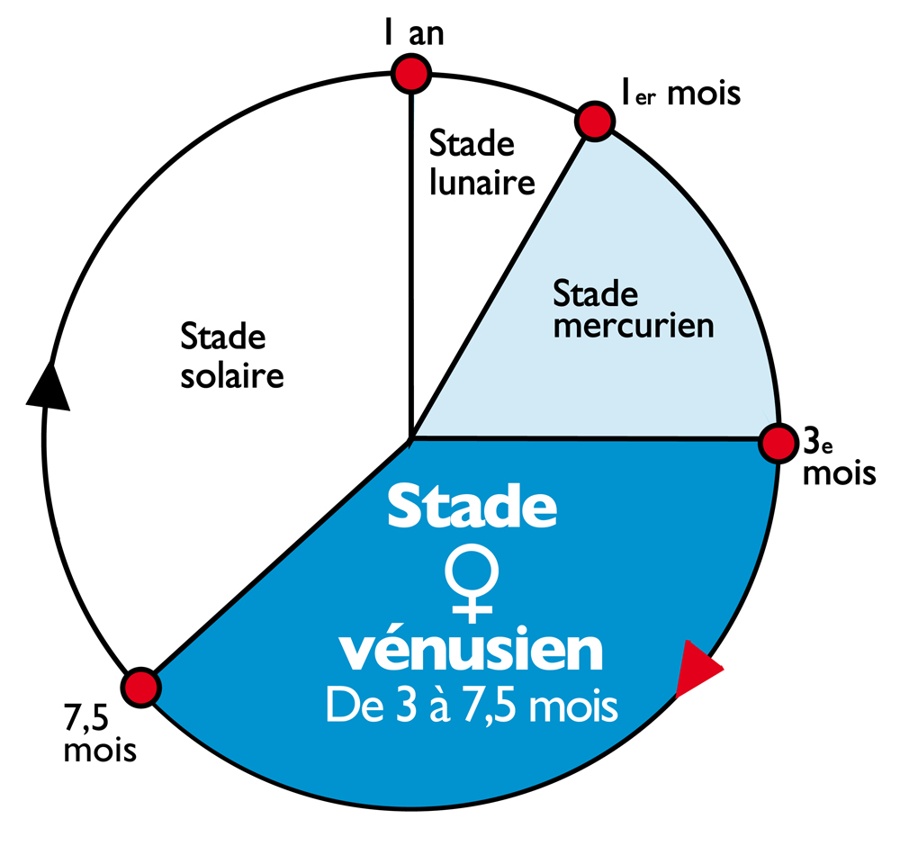
It is from about three months that the baby stops instinctively closing his hand as soon as his palm is excited, an old reflex that he had acquired during his fetal existence; moreover, he begins to effectively coordinate vision and prehension. From then on, he becomes able to follow the movements of his hands with his eyes, to grasp what he sees and to approach with his eyes the objects he has grasped… and he does not hesitate to do so! He who until now seemed so totally indifferent to the world of objects, now he spends more and more time, and feels more and more joyful pleasure, in picking them up and dropping them, touching them or sucking them, bumping them against each other or rubbing them against any part of his body.
Everything within reach exerts a powerful sensory interest on him. He must know “by body” what effect do the size, texture, weight, shape, taste, sound and color of things have on his sensitivity: hardness of cubes, softness of spheres, baby experiences, feels, smells, tastes, smells, listens sensually. Everything in his field of vision and within reach becomes an object of desire, of irrepressible temptation. This is the age when you have to start paying serious attention to what you leave near him: completely unconscious and intoxicated by his desire for new sensations, the child of this age can very well wear anything mouth or injure yourself by handling blunt objects!
It is still during this Venusian period that the baby develops, around five or six months, an extreme sensitivity to the colors that he generally prefers bright, varied: the manufacturers of children’s toys are not aware of this. elsewhere not deceived. shape, color, plasticity of objects, sensoriality: everything that fascinates the child of this age resembles what primarily interests those who are called “artists”. And precisely, astrology has also made Venus the planet of the arts, of aesthetics, of beauty. The five-month-old baby is not a budding artist, however, any more than a sex symbol. But that’s when “tastes and colors” which are well known to be indisputable, take on a decisive importance, which will subsequently condition the aesthetic sense of the adult. Who knows if the vocation of a Cézanne, a Picasso or a Van Gogh was not born in their cradle, in the childlike wonder of the discovery of these shimmering colors? Need we specify that Venus is dominant in the themes of these three painters?
The Venusian age is also that of the awakening of sensuality in human relationships. From now on, it happens to the baby to continue to suckle the maternal breast after satisfaction of its nutritional needs: it sucks for the pure pleasure of the carnal contact. Birth of eroticism… and profound change in the relationship between the baby and those around him: he ceases to be centered on his own body to take an interest in the bodies of others, which he discovers gropingly by sucking it, licking it, feeling it. Likewise, when you wash or diaper him, he babbles more and more often to show the pleasure he has in being caressed, cuddled, and even to ask for more! because it is also at this age that intentional action appears for the first time: the baby begins to know what to do to get what he wants. We will come back to it.
As for tenderness, it radiates in the relationship between mother and child at the Venusian stage. At this age, the baby attaches very deeply to those he loves and who love him. He lives with them in a climate rich in affective exchanges and permanent emotional contagion. It must be said that baby has again made enormous progress in communication, and that he knows how to translate better and better, through his laughter, smiles, mimicry, attitudes, looks, babble, vocalizations, nature, intensity and quality of the emotions that run through it.
Mum and baby then communicate in a tender loving relationship which strangely resembles the communion of the first month, but which nevertheless differs from it on an essential point: now, baby is demanding, he snuggles up against the other when we pick him up. in her arms. One cannot confuse the original fusion of the lunar stage, during which mother and baby were one, with the active search, on both sides, of reciprocal affective satisfactions. The baby from three to seven months gradually becomes a desiring person, a true individuality in search of libidinal investment.
The Venusian stage is also that of the establishment of privileged relationships between the child and the members of his entourage. Remember: the three-month-old smiled easily at strangers, showed no emotional discrimination towards those close to him and saw no problem in being held and cradled by anyone as long as it was done with a minimum of gentleness. The four-month-old child reacts quite differently: his attachments are nuanced and differentiated as he better perceives those around him. Moreover, at this age, we no longer do the same to him. “mask shot” (remember: the mercurian baby of one to three months smiled identically at a mask roughly representing a human face and at a real face). From now on, he no longer lives only in a world populated by “person-signs”, but in a universe inhabited by “flesh people”.
Likewise, before three months, the arrival of anyone was usually enough to stop her crying. At four months, only people with whom he has regular and familiar relationships achieve the same result. Better still: the more time passes, the more baby clearly shows his epidermal sympathy for certain individuals. Only they will be entitled to his tweets and vocalizations. The others, those he considers unsympathetic, will only attract his tears, like protests towards presences he cannot stand, which offend his sensitivity. Instinctive attractions and repulsions take place in his affective universe.
What are these mysterious choices about? Some are motivated by objective reasons: baby will then start to hate those who take care of him badly or awkwardly, with insufficient gentleness and delicacy. Other choices are apparently purely subjective: the child no longer accepts being manipulated by adults who are gentle and delicate… but whose head, smell, voice, look, general attitude does not come back to him. not. The comparison between the birth chart of the baby and those of people he finds spontaneously sympathetic or unsympathetic generally sheds light, to a large extent, on these subjective choices which seem incomprehensible.
In any case, compared to the previous Mercurian stage, sociability has tightened considerably, it has become hyper-selective. There is no longer this broad and undifferentiated reception. Baby only chats with and smiles at those he loves. The others are only entitled to his indifference, his fear or his tears.
These affective choices are neither reasonable nor reasoned, even and above all if they have their reasons that reason ignores… like love does. It’s a question of feeling, emotional perception: “I don’t feel this one”, “I have it in my nose, why? I don’t know, but that’s how it is.” After all, don’t adults do the same in many of their relationships? Those of them who almost systematically have this kind of behavior with others generally have a dominant Venus in their birth chart…
Love, friendship, but also hatred are typical feelings of a privileged relationship. From three months, babies begin to do their loving scales. He has his irresistible preferences. No need to try to convince the six-month-old baby that he should be nicer and kinder to this uncle or grandmother who adores him but whom the child has taken a dislike to, to their great desolation. First, he is not old enough to try to persuade him of anything. And then, the authentic feelings, that cannot be commanded. Why, once you become an adult, do you fall in love with one person rather than another? By a voluptuous and irrational process of affective, emotional contagion. We are all like a baby in the Venusian stage when we are in love. Even in our language…
Up to three months, baby reacted by smiling to the human voice. Whether his intonation was gentle or severe, caressing or growling, mattered little to him: the essential thing for him was the contact that was established, and not the affective meaning of this contact. Waiting for a sign of communication, he neglected the emotional dimension. At five months, everything changed for him in this area. His developed sensoriality makes him more and more sensitive to sounds, to the phrasing of language. Soft-toned words make him smile, he laughs if the intonation is amusing and cries if it is due, regardless of the conventional meaning of those words. whisper to him: “Dirty little capricious brawler” with a tender and velvety voice, and he will be thrilled. Tell him: “You are my beloved little darling” in the harsh tone of reprimand, and he will burst into tears.
What speaks to the baby of this age is what touches him. Words only have meaning for him if they echo in his sensitive sensitivity. Always emotive… To understand him and for him to understand us, you have to use the right tone more than the precise word. This is a primordial affective language. For the baby, the words are nothing if there is no music. In language, he moreover perceives more a song, a chant. Whether it carries a meaning does not matter to him. In their relationship of love and tenderness, baby and mother sing the same song together, in unison or by alternating the verses each in turn. The lyrics are silly or insignificant, they “baby” ? It doesn’t matter: the refrain is so sweet to the ear and the melody is so warm to both hearts…
Lovers do not do otherwise later when they use between them “languages of connivance”. Psychoanalysts will then speak of infantile regression… “…at the Venusian stage”, will specify the informed astrologers, while refusing as for them to consider this attitude only as a regression. There is no age to fall in love, even if the language of lovers draws its sources from the learning of the Venusian stage.
The title of this paragraph is borrowed from a song by Laurent Voulzy, born with a dominant Venus, at the height of his daily course. The song is called “Desire, Desire”. And since we are in the ritornello, do not hesitate to quote the complete refrain: “My first is desire, my second is pleasure, my third is suffering, and my everything is memories.” A whole Venusian program. How does it relate to the six-month-old child, a child that Laurent Voulzy stayed somewhere?
The six-month-old child already has a certain experience of the world and of interactions between individuals behind him, an experience that he has begun to memorize. Thanks to this memory, he can remember, and therefore have a mental image, an affective representation of pleasant or unpleasant, pleasant or unpleasant, gratifying or painful situations or encounters. More precisely, he has thus constituted a sensory representation, an emotional cartography, a veritable dictionary of affects. These acquisitions do not now make him capable of intentional activity: he begins to know what he wants and what he cannot, and knows how to implement the necessary means to achieve his objectives.
These are not demanding goals, ones that require self control, personal discipline, even sacrifices, quite the contrary. These goals are not heroic, do not aim to surpass oneself. They are governed by the dynamics of desire and pleasure, and aim for immediate gratification. Baby has a latent image of what he wants to achieve, and in most cases, he can only achieve his goals by encouraging those around him to help him.
For this, he has a great panoply of instruments that all have in common the power of emotional shaking. To get what he wants (a colored object, a loving presence, food, a kiss, a caress), he implements all the strategies of desire: seduction (how to resist his charming glances, his enticing smiles, to his moving facial expressions? We cannot refuse anything to such kind requests), but also self-pity (baby then begins to sob until he has obtained satisfaction), or even outright blackmail (he then deliberately gets angry, cries in a heartbreaking way, sometimes interrupting the flow of his cries and tears to assess the effect produced, then starts crying and screaming again if no one has come forward: he has understood very well how much he annoyed his loved ones in this way).
The baby at the Venusian stage, often capricious in his urgent wishes, pressing requests, impatient wishes, thus presents himself on occasion as a great affective manipulator, capable of submitting his entourage, if he is not careful, to the dictatorship of his desires, entirely tense as he is towards the quest for his good pleasure.
With regard to the baby at the Venusian stage, we have above all spoken so far of pure emotion, of affectivity, of sensitivity, of sensoriality, to the point perhaps of reducing it to an image of a child with a big heart, but not lots of brains. As if people who are primarily tender and affectionate are supposed to be stupid, as if those who do not bring forward their reflective qualities are incapable of intelligence, as if individuals who refuse to be abstract in their relationships with others are unable to understand them. As if to endorse the sexist cliché about Venus, goddess of women, love and beauty: “Be beautiful and stop talking!”
This is of course not the case. The development of intelligence continues in the child from three to seven and a half months. We have seen that during the previous stage, the baby, an astonished and curious spectator of a “new world” on which he had no direct hold, of which he had everything to discover, was reduced to calculations, conjectures, hypotheses, bewildered questions. At seven and a half months, the child acquired a new form of intelligence: that of the heart and the senses. On the side of language, for him, no abstract discourse made up of hollow and official words means nothing (moreover, he does not understand it) if it is not prolonged by a “bringing to life”, if he “does not challenge him somewhere at the level of experience”. It’s not enough for him “to wave”, it is still necessary that this sign be carnal, concrete, palpable.
We are therefore justified in evoking the appearance, at the Venusian stage, of a true intelligence of the heart. Cold, cerebral intellectuals may get a… gagging at the juxtaposition of these two seemingly opposite words: intelligence and heart. And yet, emotionally understanding someone is often better than being able to analyze them with learned speeches, illusory by dint of being far from the reality of the feeling. In another way, a painter or a violinist know how to vibrate our emotional cords, make us shudder in front of the beauty of the world as they perceive it. Will they be reproached for not being intellectuals? No, we will thank them for having that intelligence of the heart without which the most brilliant thoughts resemble withered flowers. The baby at the Venusian stage understands this, in its own way, better than anyone.
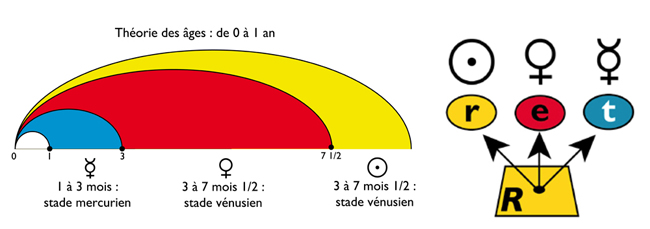
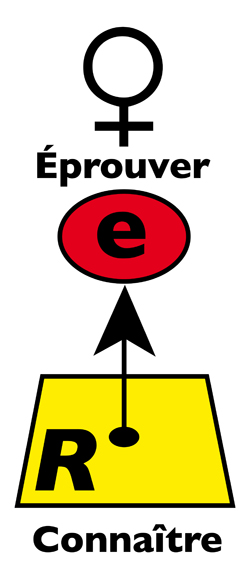
We are in venusian state, like the baby from 3 to 7 1/2 months, when we find ourselves immediately seduced, charmed by a being, a thing or a situation without our being able to justify it, explain it by any reasonable motive whatsoever, when we are in a relationship of tender complicity with a friend who understands us half-word and shares our emotions without judging them, with whom we have common tastes. We are in a Venusian state when we are in love, when we aspire with all our strength to an emotional, affective, bodily contact with others, when we determine ourselves, in our social relations, on the sole faith of instinctive sympathies or antipathies. We are in a Venusian state when we feel carnal or sexual desire, attraction or repulsion towards others from the first sight, when our heart vibrates in unison with that of the other when socially or intellectually everything could oppose us.
We are still in a Venusian state when we charm and seduce others with the greatest naturalness, when we sympathize instinctively, spontaneously with their joys and sorrows as if they were our own, by an effect of emotional contagion which owes nothing to the reason. We are also in a Venusian state when we cannot bear the sight and presence of someone, even if they have never done anything to us and regardless of their objective merits. We are still in a Venusian state when the simple contemplation of an object in a shop window makes us want to own it, when a film, a painting, music or a book moves us, makes us want to laugh or to cry, when the spectacle of the beauty of the world touches us and moves us powerfully.
We are always in a Venusian state when we intoxicate ourselves with a perfume, when we sensually caress a skin, a fabric or a cat, when we carefully choose the colors of our clothes or our decoration, when we take care to present to others a appearance as amiable and attractive as possible, so that they will be well disposed towards us. We are in a Venusian state when a simple word touches us, hurts us or seduces us intimately, when we prefer and even demand that we be spoken to with gentleness and kindness whatever the words we are told, when we are more attentive to the way people tell us things than to what they really mean, when we are insensitive to grand theories if they do not directly concern our way of experiencing and feeling. Finally, we are in the Venusian state when we violently, impatiently desire someone or something tangible, concrete, desirable, when we feel unable to resist the attraction of the flesh, when we yield with joy to all temptations, when we demand demonstrative tenderness from those we love.
You have certainly already noticed that some of us are more often in “Venusian state” that others. With a strong and dominant Venus in his birth chart, the individual has an affectivity, a sensoriality, a need for love and tenderness which, if they are not always above average, show through in any case with such frequency in his behavior that we can say of him, schematizing, that “It’s a big emotional”. With a weak Venus, on the contrary, these character traits are less marked, and sometimes even almost absent. At the very least, the individual finds it difficult to spontaneously express his tenderness, his attachments, his desires, his desires, his epidermal sensitivity…
▶ The Venusian: Psychological profile
▶ The venusian function ‘eR’ (existence of Representation)
▶ Sun-Mercury-Venus: extensive Representation
▶ Venus-Mars-Neptune: intensive existence
▶ Introduction to the Theory of Planetary Ages
▶ L’échéancier planétaire et la Théorie des âges
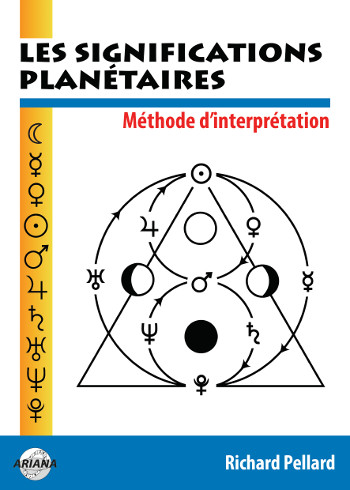
Les significations planétaires
par
620 pages. Illustrations en couleur.
La décision de ne traiter dans ce livre que des significations planétaires ne repose pas sur une sous-estimation du rôle des Signes du zodiaque et des Maisons. Le traditionnel trio Planètes-Zodiaque-Maisons est en effet l’expression d’une structure qui classe ces trois plans selon leur ordre de préséance et dans ce triptyque hiérarchisé, les Planètes occupent le premier rang.
La première partie de ce livre rassemble donc, sous une forme abondamment illustrée de schémas pédagogiques et tableaux explicatifs, une édition originale revue, augmentée et actualisée des textes consacrés aux significations planétaires telles qu’elles ont été définies par l’astrologie conditionaliste et une présentation détaillée des méthodes de hiérarchisation planétaire et d’interprétation accompagnées de nombreux exemples concrets illustrés par des Thèmes de célébrités.
La deuxième partie est consacrée, d’une part à une présentation critique des fondements traditionnels des significations planétaires, d’autre part à une présentation des rapports entre signaux et symboles, astrologie et psychologie. Enfin, la troisième partie présente brièvement les racines astrométriques des significations planétaires… et propose une voie de sortie de l’astrologie pour accéder à une plus vaste dimension noologique et spirituelle qui la prolonge et la contient.
Téléchargez-le dès maintenant dans notre boutique
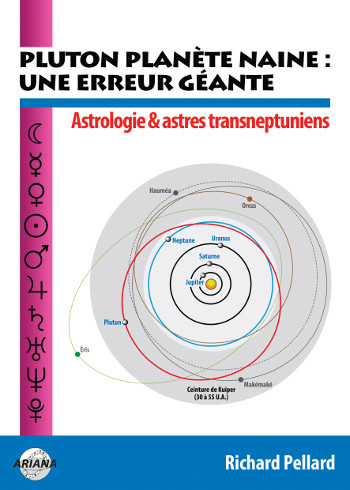
Pluton planète naine : une erreur géante
par
117 pages. Illustrations en couleur.
Pluton ne fait plus partie des planètes majeures de notre système solaire : telle est la décision prise par une infime minorité d’astronomes lors de l’Assemblée Générale de l’Union Astronomique Internationale qui s’est tenue à Prague en août 2006. Elle est reléguée au rang de “planète naine”, au même titre que les nombreux astres découverts au-delà de son orbite.
Ce livre récapitule et analyse en détail le pourquoi et le comment de cette incroyable et irrationnelle décision contestée par de très nombreux astronomes de premier plan. Quelles sont les effets de cette “nanification” de Pluton sur son statut astrologique ? Faut-il remettre en question son influence et ses significations astro-psychologiques qui semblaient avérées depuis sa découverte en 1930 ? Les “plutoniens” ont-ils cessé d’exister depuis cette décision charlatanesque ? Ce livre pose également le problème des astres transplutoniens nouvellement découverts. Quel statut astrologique et quelles influences et significations précises leur accorder ?
Enfin, cet ouvrage propose une vision unitaire du système solaire qui démontre, chiffes et arguments rationnels à l’appui, que Pluton en est toujours un élément essentiel, ce qui est loin d’être le cas pour les autres astres au-delà de son orbite. Après avoir lu ce livre, vous saurez quoi répondre à ceux qui pensent avoir trouvé, avec l’exclusion de Pluton du cortège planétaire traditionnel, un nouvel argument contre l’astrologie !
Téléchargez-le dès maintenant dans notre boutique